Nausea Relief Calculator
Enter your information to see personalized relief strategies
Why Medications Make You Nauseous
It’s not just bad luck when a pill makes you feel sick. Nausea and vomiting from medications happen because those drugs interact with your body in ways that trigger your brain’s vomiting center. Some meds irritate your stomach lining directly - like NSAIDs or iron supplements. Others hit receptors in your gut or brain that say, “Something’s wrong, time to empty out.” This is especially common with chemotherapy, antibiotics, and even common over-the-counter vitamins.
For example, if you’ve ever felt queasy after taking an antibiotic on an empty stomach, that’s not your imagination. It’s the drug stirring up your gut. Same with chemo: without prevention, up to 80% of patients get sick. Even SSRIs - antidepressants many people rely on - can cause nausea, especially in the first few weeks. The key isn’t just to tolerate it. It’s to stop it before it starts.
First Line of Defense: Simple, Proven Tactics
You don’t always need a prescription to feel better. Some of the most effective ways to prevent nausea are the easiest ones. Start with food. Unless your doctor says otherwise, take your meds with a small snack - not a full meal, but something light like crackers, toast, or rice. This buffers your stomach and cuts down on irritation. It works wonders for NSAIDs, antibiotics, and multivitamins.
Also, avoid heavy, greasy, or overly sweet foods when you’re feeling off. Stick to bland, starchy options. Dry toast, plain pasta, or bananas are good choices. Drink fluids slowly - sipping water, clear broth, or ginger tea helps prevent dehydration without overwhelming your stomach. Many people swear by ginger: ginger chews, capsules, or tea reduced nausea from chemo by more than half in real patient reports. One person on a cancer forum said their nausea dropped from an 8 out of 10 to a 3 after just one day of ginger every two hours.
Timing matters too. If you’re taking something like an SSRI that causes dizziness and nausea, taking it at bedtime can help. You sleep through the worst of it. For meds that need to be taken on an empty stomach, wait at least 30 minutes before eating anything. Don’t rush it.
When Food and Timing Aren’t Enough
If you’re still nauseous after trying these basics, you’re not alone. Many people need a little extra help. The first step is often a serotonin blocker like ondansetron (Zofran). It’s one of the most common anti-nausea pills used in hospitals and clinics. It works by blocking the signals from your gut to your brain that say, “Throw up.” A single 4mg tablet can make a huge difference - especially after chemo or surgery.
For more serious cases, especially with strong cancer drugs, doctors may combine ondansetron with another class of drug called an NK-1 receptor antagonist, like aprepitant (Emend). These are powerful. When used together with steroids like dexamethasone, they can prevent nausea in up to 85% of patients. That’s not a guess - it’s backed by clinical trials from the National Cancer Institute.
But here’s the catch: these drugs aren’t cheap. A single dose of aprepitant can cost $150 to $300 without insurance. That’s why some patients skip them, even when they’re recommended. If cost is a problem, talk to your doctor. There are generic versions, patient assistance programs, and sometimes alternatives that work nearly as well for less.
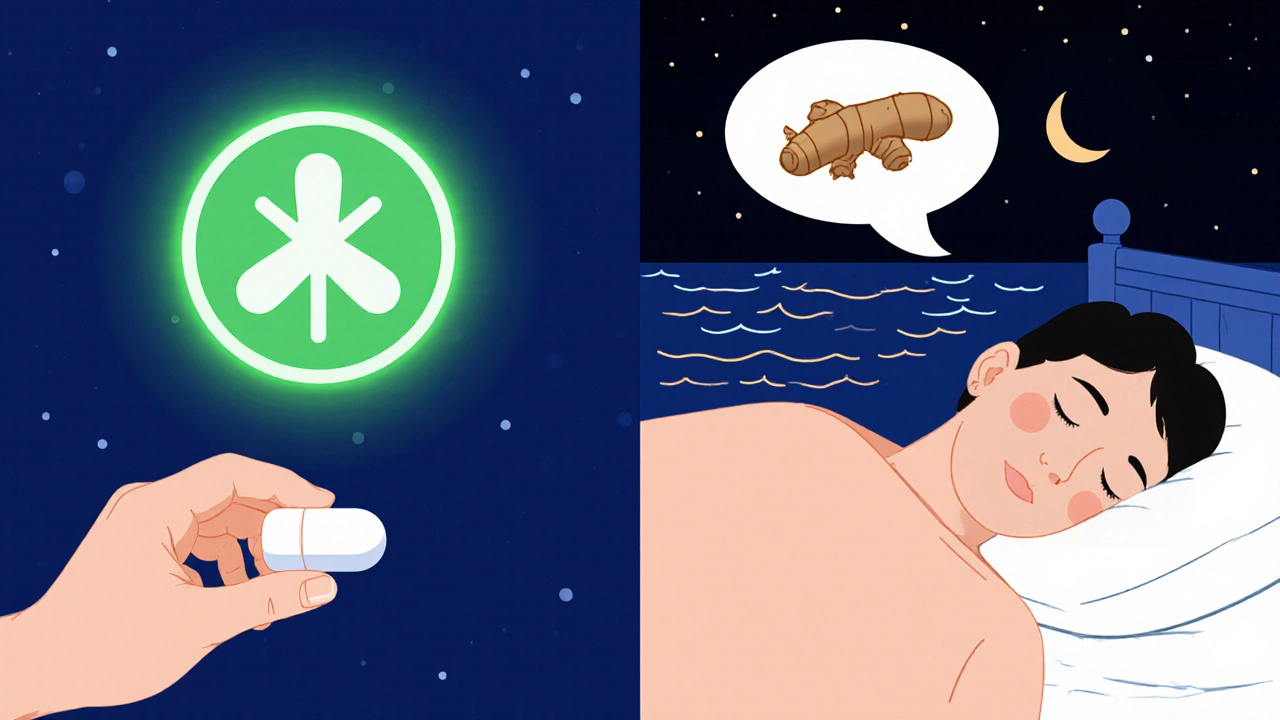
What About Natural or Alternative Options?
Ginger isn’t the only natural option that works. Acupressure wristbands - the kind used for motion sickness - have helped some people with chemo-related nausea. While the science isn’t rock-solid, there’s no harm in trying if you’re open to it. Deep breathing, meditation, and progressive muscle relaxation also help. When your body is tense, nausea gets worse. Calming your nervous system can break the cycle.
Some people find relief with fresh air. Opening a window or stepping outside for a few minutes when you feel sick can reduce the intensity. Avoid strong smells - perfumes, cooking odors, cigarette smoke - they can trigger vomiting even when you’re not feeling terrible yet.
And don’t ignore your mental state. Anticipatory nausea - when you start feeling sick just thinking about your next chemo session - is real. It affects nearly 30% of cancer patients. Medications don’t help much here. But cognitive behavioral therapy (CBT) does. Talking to a therapist who specializes in cancer care can retrain your brain to stop linking treatment with sickness.
When to Call Your Doctor
Not all nausea is the same. If you’re vomiting more than once a day, can’t keep fluids down, or feel dizzy or faint, you need to call your provider. Dehydration can turn a bad side effect into a hospital visit. Same if nausea lasts longer than a few days after starting a new med. Sometimes, the problem isn’t the drug itself - it’s an interaction, an infection, or another condition like gastroparesis.
Don’t stop your meds just because you feel sick. That’s how treatment fails. Instead, tell your doctor exactly what’s happening: when it started, what makes it better or worse, how often you’re vomiting, and whether you’ve tried any remedies. Bring a list. This helps them decide if you need a different drug, a lower dose, or an antiemetic.
For chronic nausea - like from migraines, diabetes, or functional disorders - low-dose tricyclic antidepressants like nortriptyline can help. But they don’t work for everyone. A major 2021 trial found they didn’t improve nausea in people with idiopathic gastroparesis. That means context matters. Your doctor needs to know your full history before prescribing.
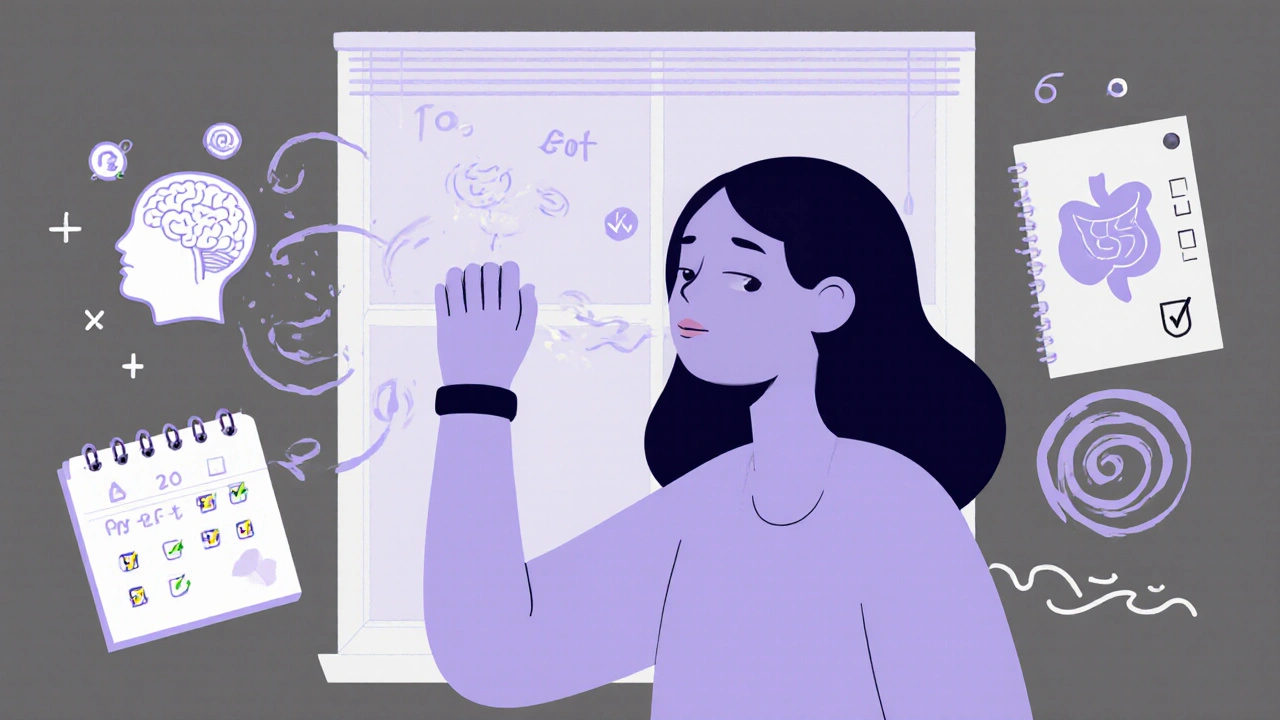
What’s New in Nausea Control
The field is moving fast. In 2023, the FDA approved rolapitant (Varubi) for kids as young as 2 with cancer-related nausea. That’s a big deal - pediatric antiemetics were limited before. Hospitals are also starting to use digital tools. Apps like Nausea Tracker let patients log symptoms daily. Some cancer centers are piloting these to catch problems early and adjust meds before things get bad.
There’s also growing interest in pharmacogenomics - testing your genes to see how you’ll respond to certain anti-nausea drugs. Some people metabolize ondansetron too quickly. Others have a genetic variation that makes them more prone to side effects. In the next few years, this kind of testing could become routine, helping doctors pick the right drug for you before you even take the first pill.
Final Thoughts: You’re Not Alone
Medication-induced nausea is common. It’s not weakness. It’s biology. But it’s also manageable. Most people can find relief with a mix of simple changes, smart timing, and the right meds. The goal isn’t to never feel sick again - it’s to keep you on your treatment, keep you hydrated, and keep your life from being ruled by nausea.
Start with food, fluids, and ginger. Then talk to your doctor about options. Don’t suffer in silence. There’s help - and you deserve to feel better while you heal.
Can I take anti-nausea meds with my other prescriptions?
Yes, but only under medical supervision. Anti-nausea drugs like ondansetron or dexamethasone can interact with other medications. For example, combining ondansetron with certain heart drugs can affect your heart rhythm. Always tell your doctor or pharmacist about every medication, supplement, or herb you’re taking before starting a new antiemetic.
How long does medication-induced nausea usually last?
It depends on the drug. For antibiotics or painkillers, nausea often fades within a few days as your body adjusts. With chemotherapy, it can last longer - especially delayed nausea, which peaks 2-5 days after treatment. Anticipatory nausea can stick around for weeks or months unless treated with behavioral therapy. If nausea lasts more than a week without improvement, contact your provider.
Are there any foods I should avoid when feeling nauseous from meds?
Avoid spicy, greasy, or very sweet foods. Strong smells - like fried food or coffee - can make nausea worse. Also, don’t eat your favorite foods when you’re sick. If you throw up after eating pizza, you might start associating pizza with nausea, and even the smell of it could trigger sickness later. Stick to plain, bland carbs like rice, toast, or boiled potatoes.
Can I use over-the-counter nausea meds like Pepto-Bismol?
Pepto-Bismol (bismuth subsalicylate) can help with mild stomach upset, but it’s not designed for drug-induced nausea. It also contains salicylates, which can interact with blood thinners or NSAIDs. For nausea from prescriptions, it’s better to use proven antiemetics like ondansetron or ginger supplements. Always check with your pharmacist before using OTC remedies with your meds.
Why do some people get nausea from meds and others don’t?
It’s a mix of biology and behavior. Genetics play a role - some people naturally have more sensitive nausea triggers. Gender matters too: women are more likely to experience nausea from meds than men. Age, hydration, stress levels, and even gut bacteria can influence how your body reacts. That’s why a one-size-fits-all approach doesn’t work. Personalized care - adjusting dose, timing, and support - is the most effective strategy.

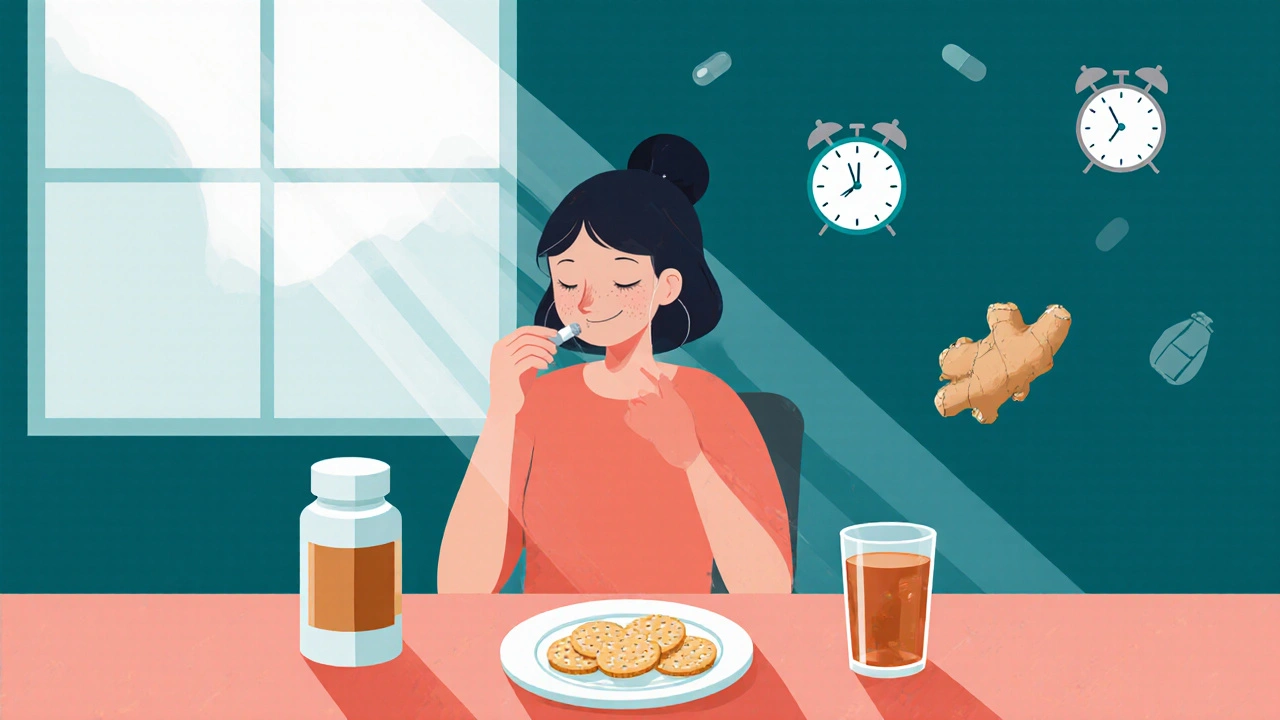
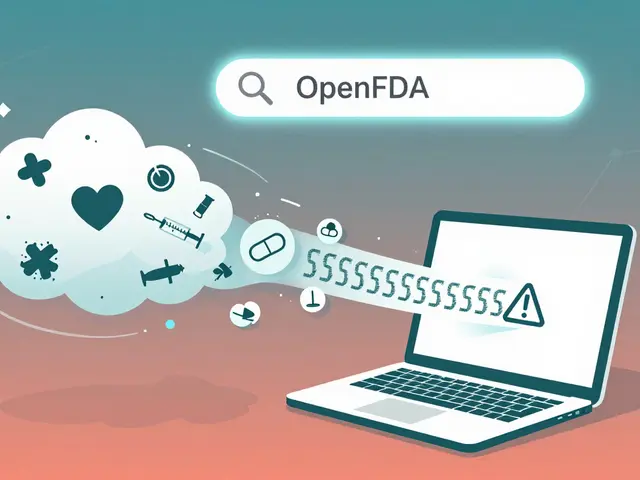
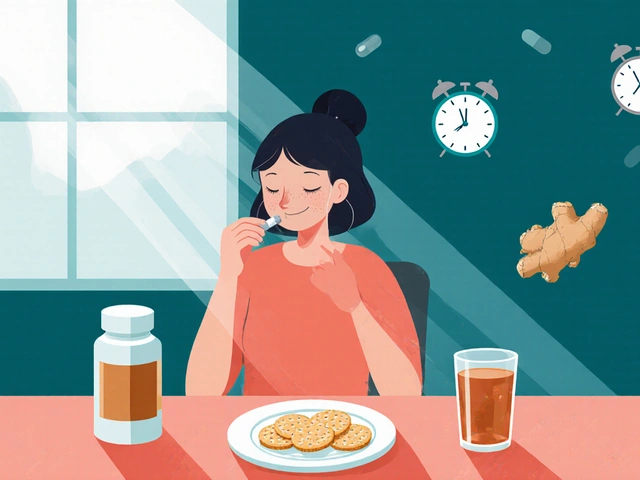
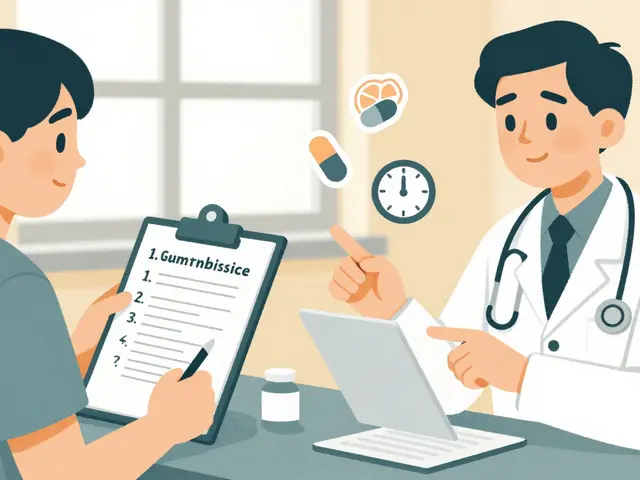
Marcia Facundo
November 1, 2025 at 22:14I took Zofran after my chemo and it was a game-changer. Seriously, I went from crying in the bathroom to eating toast like a normal human. Ginger tea helped too, but that pill? Magic.
Also, never take antibiotics on an empty stomach. Learned that the hard way.
Ajay Kumar
November 3, 2025 at 04:06You people are overcomplicating this. Nausea isn't a medical mystery-it's your body saying 'this chemical is poison.' Why not just stop taking the damn drug if it makes you sick? I've been on 12 different prescriptions in my life and only two made me vomit. I quit both. No one told me I had to suffer for science. Your body knows better than some PhD with a clipboard. And don't get me started on 'natural remedies.' Ginger? That's what your great-grandma used when she had a bad burrito. Modern medicine has better tools. Use them or don't take the pill. Simple.
Pradeep Kumar
November 3, 2025 at 18:54So happy to see this post! 🙌 I'm from India and my mom took chemo last year-ginger tea, crackers, and sleeping after meds saved her. We didn’t know about Zofran at first, but our doctor suggested it and wow. Also, acupressure bands? She wore them like bracelets and said they helped her feel calmer. No magic, just small things adding up. 💪 You’re not alone, and yes, it gets better. Keep going!
Andy Ruff
November 5, 2025 at 03:05Let me just say this: if you're taking SSRIs and vomiting, you're probably not mentally ill-you're just weak. I've been on fluoxetine for 8 years. I felt queasy for 3 days. Got over it. Your brain is a muscle. Train it. Stop treating yourself like a fragile flower. Ginger? Seriously? That's for people who can't handle the side effects of modern science. If you're too delicate to take a pill without whining, maybe you shouldn't be on the drug in the first place. Stop coddling yourself.
Justin Vaughan
November 6, 2025 at 22:33Nausea isn't a bug-it's a feature of your body trying to protect you. Think of it like your internal alarm system going off because the drug smells like poison (even if it's not). The trick isn't to ignore it, but to work with it. Food timing? Genius. Bedtime SSRIs? Lifesaver. Ginger? Yes. But here's the real secret: your nervous system is connected to your gut. If you're stressed, your nausea gets worse. Breathe. Walk outside. Don't fight the feeling-soften into it. That’s how you break the cycle. And yeah, Zofran works-but so does your own calm. You're not broken. You're just human.
Manuel Gonzalez
November 8, 2025 at 10:08I appreciate how practical this is. Taking meds with a small snack is such an easy fix, and I wish more doctors mentioned it. I had a patient last month who was vomiting every time she took her iron pill-turned out she was taking it at 7 a.m. with coffee. We switched to bedtime with a banana. No more nausea. Simple. Also, the point about avoiding favorite foods? Spot on. I’ve seen people develop aversions to pizza or sushi after one bad reaction. It’s not psychological-it’s associative learning. Your brain remembers. Be kind to it.
Brittney Lopez
November 8, 2025 at 20:51I’m a nurse and I see this every day. People feel guilty for needing help with nausea like it’s a personal failure. It’s not. It’s biology. The fact that you’re even reading this means you’re already doing better than most. Try the ginger. Try the timing. Talk to your doctor. You don’t have to suffer. And if you’re helping someone else through this? Just say, 'I’m here.' That’s enough. You’re doing great.
Jens Petersen
November 10, 2025 at 18:18Let’s be real: the entire anti-nausea industry is a profit-driven circus. Ondansetron? Patent expired. Costs $0.12 to produce. Sells for $150. Aprepitant? $300. Meanwhile, ginger root costs $2 a pound. And they want you to believe you need a $200 pill to stop your stomach from rebelling? Pathetic. The real solution? Stop giving people drugs that make them sick in the first place. Pharma doesn’t care if you vomit-they care if you keep buying. This isn’t medicine. It’s capitalism with a stethoscope. And don’t even get me started on ‘pharmacogenomics’-that’s just the next shiny thing to sell you another test. Do the basics. Ginger. Food. Timing. Stop letting corporations sell you your own relief.